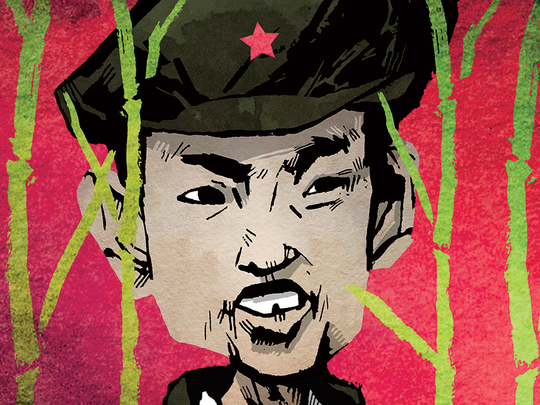
How I Became a North Korean
By Krys Lee, Viking, 256 pages, $26
There is something about the improbability of North Korea’s very existence that makes whatever atrocity crosses the page sound entirely plausible. As the author of a nonfiction book about the country, I find myself too often answering questions from confused readers. I have had to explain repeatedly that, no, I’ve not heard of political prisoners undergoing lobotomies there, as happens in Adam Johnson’s justly acclaimed “The Orphan Master’s Son”; and that the author was employing techniques of magic realism to create a satirical vision of North Korea.
So it was with some trepidation that I picked up the latest offering in the genre of fiction set there. Krys Lee is a superb writer, author of a well-reviewed collection of short stories, “Drifting House”, and her first novel has been one of the most anticipated of the year.
Since it happens in the first few pages, it is not too much of a spoiler to reveal that the book opens with a bang. The scene is a lavish banquet in Pyongyang in 2009, in which Rolex-wearing members of the elite nibble on blow fish and tuna flown in from the Tokyo fish market. Then leader Kim Jong-il takes a revolver and shoots a romantic rival in the heart. No matter what you think of the brutality of the regime, this would never happen, especially not before hundreds of witnesses. The North Koreans have more discreet methods of disposing of their enemies.
But this is a quibble because Lee, a Korean-American who now lives in Seoul, knows North Korea and gets almost all the rest right, down to exacting details. Yongju, the 21-year-old son of the man shot at the banquet, needs to escape the country to avoid being held accountable for his father’s offence under the regime’s system of collective punishment. He is a sheltered young man “who didn’t know anybody who was exiled to grim mining towns or ground tree bark into their stew in order to fill their stomachs”; he and his family used to have nothing in common with provincial schoolkids forced to work in the opium fields.
He crosses the border into China, where he has to hide with ordinary North Korean refugees. He becomes one of them, learning “how to sleep with rats the size of rabbits, how to endure the slow crawl of lice. How drinking helped you live with unlivable fear. How you could wake up with frozen icicles in your hair, not knowing if one of the boys would be frozen dead, forever 14.”
Most North Korean defectors come out through China; at any given time, there are thousands of them living in hiding, terrified that they will be caught and deported back home. Women are trafficked as sex workers or wives for unmarriageable Chinese farmers. Men are press-ganged into brick factories. Missionaries feed and house refugees, but sometimes keep them prisoner while they are forced to read the Bible, indoctrinated with yet another ideology to replace the blind loyalty to their home country’s regimes.
Lee has worked with North Korean refugees and she knows intimately their terror when trying to survive in a world where it is impossible to distinguish between friend and foe; where betrayal is a fact of life and people manipulate each other with currencies of sex and religion.
The novel switches between three narrators. Besides Yongju, the fallen scion of the elite, there is Jangmi, a pregnant defector who is locked up in a video chatroom where she has to strip on camera for South Korean perverts. (Yes, this really happens.) My favourite of the three is Danny, a Bible-thumping high school student prone to misadventures. Danny is an ethnic Korean from China who grew up in California and is as confused about his faith as he is about his nationality. After he is robbed on a trip to China, he joins up with the others. The message is clear: without passport or money, identity or status, anybody can be as adrift as a North Korean refugee.
–Guardian News & Media Ltd
Barbara Demick’s “Nothing to Envy: Real Lives in North Korea” is published by Granta.









